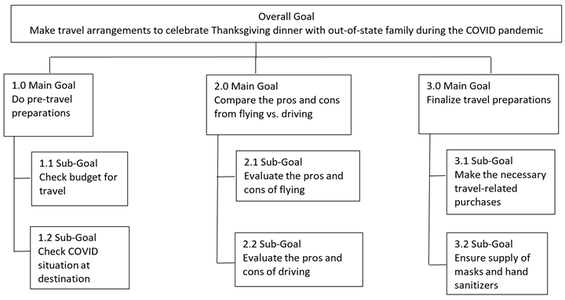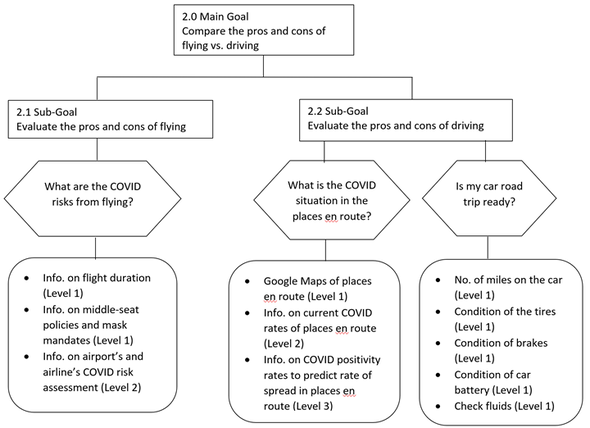 Grace Teo, Ph.D., Sr. Research Psychologist Grace Teo, Ph.D., Sr. Research Psychologist Like almost everything else, Thanksgiving this year will be far from normal thanks to the COVID-19 pandemic. No doubt most of us are still keen to carry on with the activities that characterize the season. My goal this Thanksgiving is modest: to have a safe, enjoyable, delicious, Thanksgiving where I get to catch up with family and friends, recounting fond memories, dodging embarrassing questions, enduring rude remarks and avoiding arguments. Yes, a good Thanksgiving. COVID has definitely added concerns to my travel plans, as it has with others (Sarmiento & Wamsley, 2020). Should I fly or drive? What are the COVID risks from being at the airport? Is it enough that the airline mandates masks to be worn at all times? What should be my route if I’m driving and what are the COVID risks from that? Leading a QIC project that is employing Goal Directed Task Analysis (GDTA; Endsley, Bolte, & Jones, 2003), I decided to apply it in the context of my travel conundrum. A GDTA documents a task in terms of the goals to be achieved, the key decisions that determine the extent which the goals are met, and the information requirements needed to make those decisions. The GDTA has been used to describe complex unstructured tasks that can involve ill-defined processes and outcomes such as maritime navigation (Sharma, 2019), critical monitoring tasks (Rummukainen, 2016), paramedics’ tasks (Abd Hamid & Waterson, 2010), supervisory control tasks (Kaber et al., 2006), and command and control decision making (Bolstad et al., 2000), so of course it is capable of helping to resolve my problem. Applying the GDTA methodology to my overall goal is to make travel arrangements for Thanksgiving this year, I defined the main and subgoals in the following Goal Hierarchy (Endsley, 1993) (see Figure 1). According to Endsley and Garland (2000), the GDTA information required can be further categorized as that which enables the decision maker to:
After identifying the above goals and subgoals, I identified the decisions that are associated with these goals as well as the information I needed to make those decisions at various levels. The result is a Relational Hierarchy (Figure 2). So, have I made my decision yet? Well, no… but thanks to the GDTA process I have systematically determined the information needed to make that decision. As new information becomes available, I can apply it to this framework. If another viable transportation mode is suddenly invented (e.g. teleportation), I can expand the analysis to include that mode of transportation. Has the COVID pandemic changed the way you are making your travel plans this Thanksgiving? Try doing your own GDTA to see if that helps. [Addition 09/15/2021] - there is also a wealth of information available specifically for seniors. much of which is also applicable to the general public here - https://www.bankrate.com/insurance/car/senior-driver-safety-amid-covid/. References
Abd Hamid, H., and Waterson, P. (2010). Using Goal Directed Task Analysis to Identify Situation Awareness Requirements of Advanced Paramedics. Int. Conf. Adv. Hum. Factors Ergon. Healthcare, 672-680. Bolstad, C. A., Riley, J. M., Jones, D. G., & Endsley, M. R. (2002). Using goal directed task analysis with Army brigade officer teams. In Proceedings of the Human Factors and Ergonomics Society Annual Meeting (Vol. 46, No. 3, pp. 472-476). Sage CA: Los Angeles, CA: SAGE Publications. Endsley, M. R. and Garland D. J (Eds.) (2000) Situation Awareness Analysis and Measurement. Mahwah, NJ: Lawrence Erlbaum Associates. Endsley, M.R., Bolte, B., & Jones, D.G. (2003), Designing for Situation Awareness: An Approach to Human-Centred Design. Taylor & Francis: London. Kaber, D. B., Segall, N., Green, R. S., Entzian, K., & Junginger, S. (2006). Using multiple cognitive task analysis methods for supervisory control interface design in high-throughput biological screening processes. Cognition, technology & work, 8(4), 237-252. Rummukainen, L., Oksama, L., Timonen, J., & Vankka, J. (2015). Situation awareness requirements for a critical infrastructure monitoring operator. In 2015 IEEE International Symposium on Technologies for Homeland Security (HST) (pp. 1-6). IEEE. Sarmiento, I.G. & Wamsley, L. (2020). Coronavirus FAQs: Is It Safer To Fly Or Drive? Is Air Conditioning A Threat? Retrieved from https://www.npr.org/sections/goatsandsoda/2020/05/30/865340134/coronavirus-faqs-is-it-safer-to-fly-or-drive-is-air-conditioning-a-threat Sharma, A., Nazir, S., & Ernstsen, J. (2019). Situation awareness information requirements for maritime navigation: A goal directed task analysis. Safety Science, 120, 745-752.
0 Comments
|
AuthorsThese posts are written or shared by QIC team members. We find this stuff interesting, exciting, and totally awesome! We hope you do too! Categories
All
Archives
June 2024
|





 RSS Feed
RSS Feed